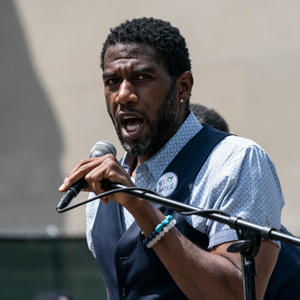The appointment of a socialist tenant advocate to the City Planning Commission won’t by itself block development in New York City, but it could be a thorn in the side of an already wounded real estate industry.
Public Advocate Jumaane Williams has nominated tenant advocate Cea Weaver to the City Planning Commission, the New York Post first reported. She would replace Michelle de la Uz, who was often a dissenting vote within the body (she voted against the Lenox Terrace expansion and the Special Flushing Waterfront District).

Jumaane Williams (Getty)
In a statement, Weaver said the City Planning Commission is a “public entity and should be driven by and for the public good rather than private interests.” Her colleagues on the commission would concur, but figure to disagree with Weaver on how to achieve that public good and how much private interests can benefit in the process.
The public advocate appoints one of the commission’s 13 members, who include experts in urban design, finance, real estate, law and both market-rate and low-income development. Weaver would be the panel’s only tenant advocate.
The first question is whether Weaver’s nomination will be confirmed by the City Council. Her association with the Democratic Socialists of America and previous clashes with City Council majority leader Laurie Cumbo — who last year held a counter-protest against a DSA-backed Senate candidate — are no secret. Weaver has focused much of her work on state-level legislation, but in 2017 she was also at odds with Cumbo over the Bedford-Union Armory development, which ultimately went forward.
But it would be a shock if the Council picked a fight with Williams, who presides over Council meetings and is popular with constituents and colleagues. In a statement he called Weaver “an unwavering advocate for equity and justice on behalf of New Yorkers” and urged the chamber to quickly confirm her appointment.
Typically, the City Planning Commission gives the green light to development projects during the city’s public land-use review process, after the local community board and borough presidents have weighed in. To stop new developments, Weaver would have to persuade six of the commission’s other members to vote with her — an unlikely scenario. Seven are mayoral appointees.
But she could use her perch to draw attention to her agenda, which includes canceling rent, funding public housing and stopping all evictions. With a formal platform, she could face off with developers directly during public hearings.
Asking pointed questions of developers and other stakeholders can affect the outcome of projects, and after the Amazon HQ2 debacle, the death of the Industry City rezoning and Mayor Bill de Blasio’s reversal on a Crown Heights residential project, few would discount the role of public opinion.
In a webinar hosted by The Real Deal last year, Weaver spoke of land owners’ historical role as gentry and argued that they should be obliged to share more of their wealth with the less-monied classes.
“Asking folks who have generated wealth off of owning land for many years to give up a little bit during great social need, while we fight for government intervention, is not that drastic of a thing,” she said then, arguing that rent should be canceled during the pandemic.
In a statement to the New York Post, REBNY president James Whelan said Weaver’s appointment would be a “significant setback” for the city’s post-pandemic economic recovery.
“[I]t would be unfortunate if the City Planning Commission became another vehicle to block the creation of good jobs and much-needed housing and investment,” he said.
But others feel differently. Queens state Sen. John Liu, who as a City Council member and later comptroller was frequently at odds with former Mayor Michael Bloomberg, hailed Weaver’s addition to the commission as an “important appointment.”
“The City Planning Commission has historically been over-represented by developers, and woefully under-represented by housing advocates,” Liu said. Being a dissenting voice, even if it does not change the outcome, should not be dismissed as a “protest vote,” said the former comptroller, whose appointees were known to cast dissenting votes against Bloomberg-backed measures.
One other way Weaver’s appointment could affect the real estate industry is by giving one of its most ardent foes a well-paying part-time job for at least a five-year term.
Commissioners receive a salary of nearly $65,000 (the chair, Marisa Lago, is also the director of City Planning and earns $243,171). For comparison, Weaver earned $45,000 for a nine-month gig orchestrating the tenant campaign to rewrite New York’s rent law.
With the potential for reappointment, Weaver’s agenda could have an official platform for many years to come.
Read more



